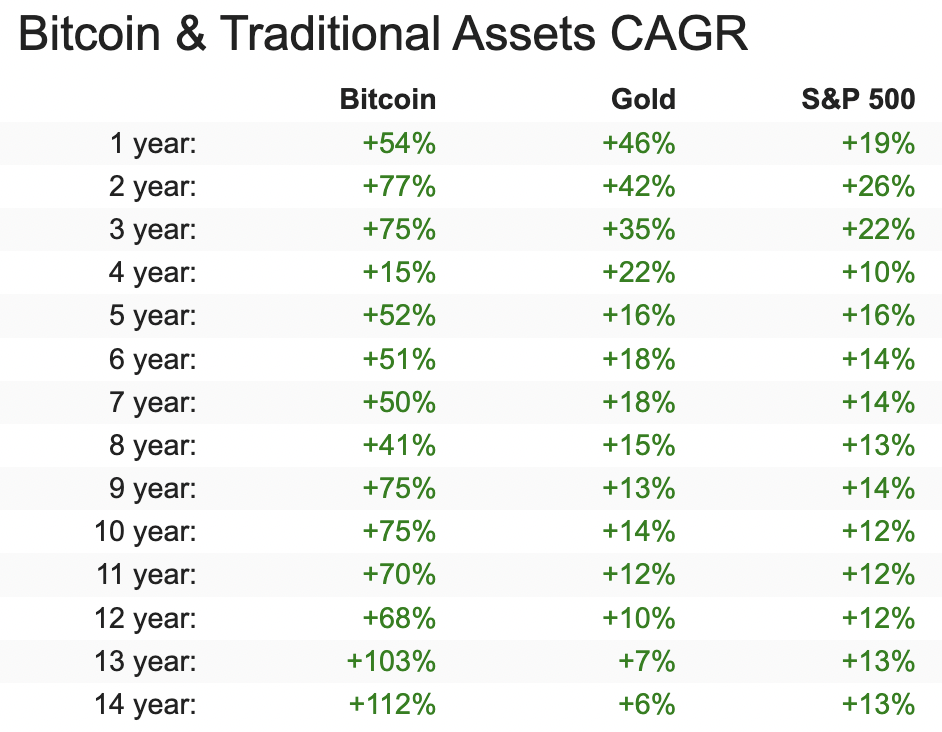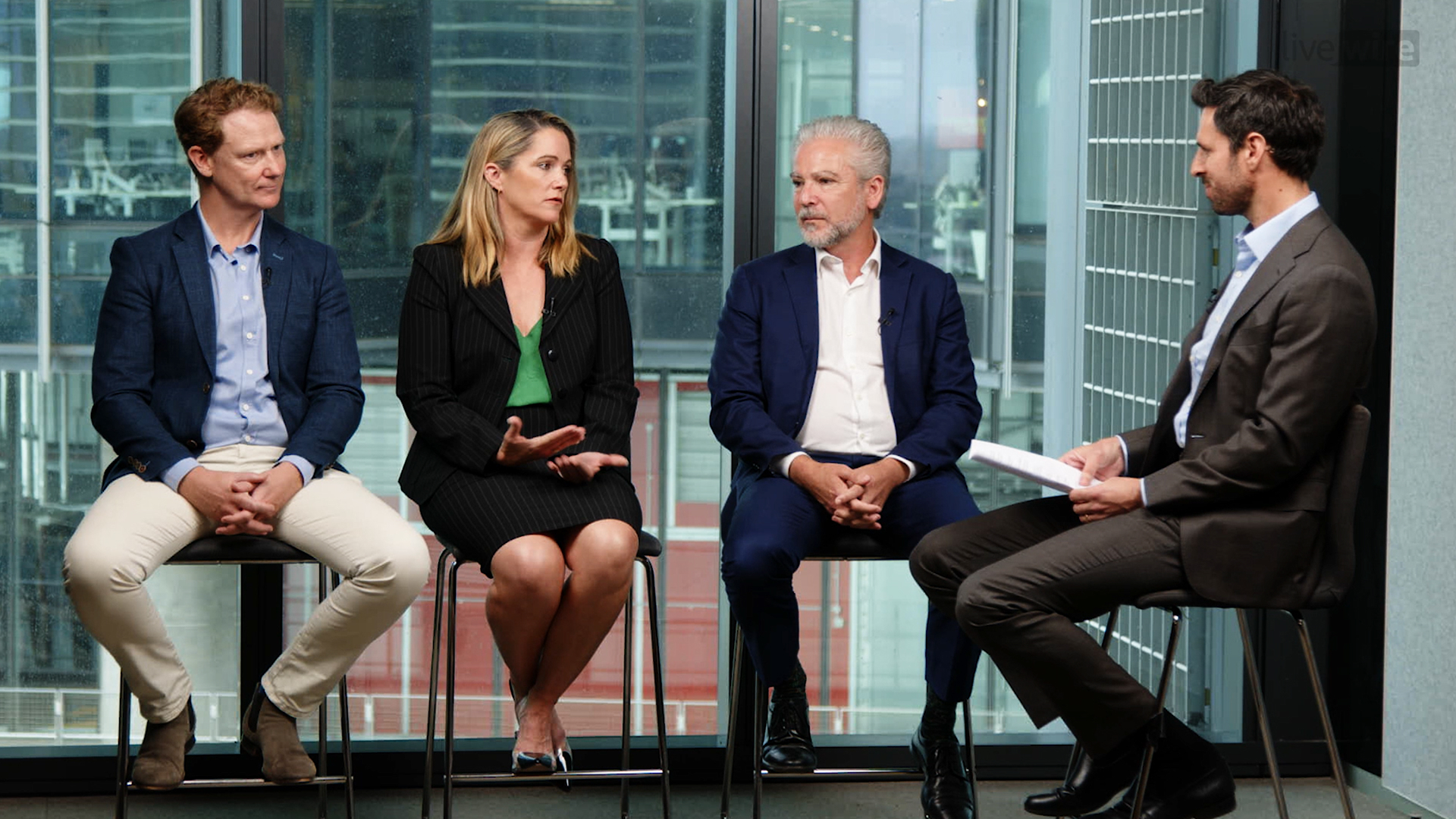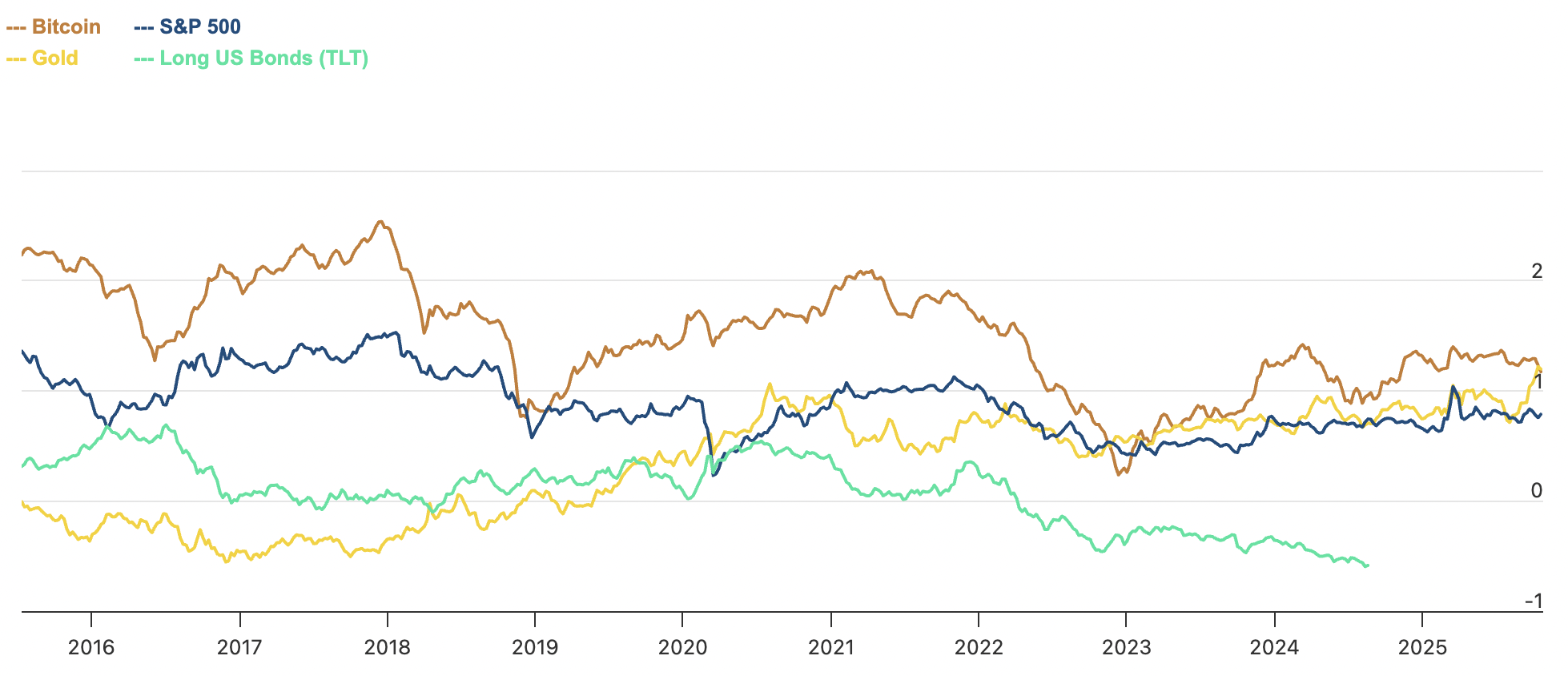Making the case for the best-performing asset in history
Please note this video was filmed on 23 October 2025.
Few assets have managed to divide opinion or attract such passionate discussion as Bitcoin.
The original cryptocurrency and digital asset was created in 2009 by the pseudonymous Satoshi Nakamoto to be a truly-digital currency and in the intervening 16 years, has enjoyed a meteoric, if controversial, rise to become one of the most compelling alternative assets available to investors.
On the numbers alone, Bitcoin is irrefutably the best-performing asset of all time.
Having traded for fractions of a cent in its early years, a single Bitcoin is now worth more than US$100,000.

But it hasn't been without drama. Bitcoin has been prone to extreme boom-and-bust cycles so severe that they've posed an existential threat to the asset itself. It remains a fairly volatile investment, despite volatility having lessened in recent years.
The launch of the first spot Bitcoin ETFs in US markets in January 2024 also smashed records, and now boast almost US$150 billion in AUM.
But for those who may have watched Bitcoin's rise with skepticism, suspicion or even simply confusion, it's hard to know where to start even assessing it as a potential investment.
As part of Livewire's Alternatives Series, I sat down with Ryan McMillin, Co-Founder & CIO of digital asset manager Merkle Tree, Bridget Nichols, chief commercial officer at Monochrome, and Stuart Eliot, head of portfolio management at AMP to answer the big questions you likely have around Bitcoin.
In this panel, our expert guests offer their insights on everything from the outlook and investment thesis for Bitcoin, why it's time investors need to start paying attention, and how they actually go about investing in it.

Setting the stage for Bitcoin
The last few years have been transformative for Bitcoin's maturation as an asset class.
Firstly, the difference in regulatory approach from the Trump administration to the Biden administration has been "night and day", says Merkle Tree's Ryan McMillin.
"We're seeing specific crypto regulations instead of regulation by enforcement. We're seeing some actual rules being set in place, so it's really positive for everybody in the industry."
There's also been a lot of development on the market infrastructure side of things, says Monochrome's Bridget Nichols. "We're also seeing a quite significant maturity uplift across trading infrastructure for Bitcoin. Bitcoin is starting to look a lot more like trading a traditional commodity."
The development of CME bitcoin futures products and NASDAQ options over bitcoin ETFs have seen institutional participation rates of 74%, says Nichols. "With that comes professional market makers, a lot more transparency in the market and a lot more confidence."
The current macro conditions has also helped improve the outlook for Bitcoin as an alternative investment, says AMP's Stuart Eliot. "It's really the same thing that's driving gold higher, which has obviously been a big focus recently, and that's people rationally trying to protect their portfolios against inflation."
"People want to have some sort of investment in their portfolio that's going to help protect their real spending power."
"Bitcoin is being increasingly seen as a substitute asset for gold in terms of its ability to protect against inflation."
Bitcoin's core investment thesis
"Our investment thesis is that Bitcoin is an emerging store of value asset in an increasingly digital world," says AMP's Eliot. "It's gold that you can send on the internet."
Like gold, Bitcoin has many of the agreed-upon properties of store-of-value assets, namely scarcity, portability, durability and protection from censorship.
It means Bitcoin is now being recognised alongside gold for its role in the so-called "debasement trade", with JPMorgan and other institutions now specifically recommending an allocation to the cryptocurrency to hedge against inflation.
"There's certain assets that will typically historically beat that inflation drag," says McMillin. "Bitcoin is increasingly seen as one of them. Gold, certainly, was the longest one. Property is another one. They do a great job at protecting your portfolio. And I think what we're seeing now is Wall Street saying you actually need a portion of your portfolio dedicated to exactly this."
"A lot of historically sceptical investors have jumped on board," adds McMillin. "Morgan Stanley is the latest to flip and is now recommending 2-4% allocation. Then you've got these investing greats like Paul Tudor Jones, Druckenmiller, Ray Dalio, all have been advocating for a little while for Bitcoin and gold, particularly as part of that debasement trade."
With people lining up to buy gold, it's clear there's a growing awareness around currency debasement and how investors can protect against it. It sets the stage nicely for an emergent asset that's still in its infancy.
"We're still very early in the Bitcoin maturity cycle," says Nichols. "The technology's only been around since 2009 and there's a very long way to play."
"We have the regulatory clarity that we spoke of, the governance advancements, the institutional trading participation coming in, and I think all of these things reduce friction and expand the participation base for Bitcoin."
Understanding the actual risk
Bitcoin has attracted its fair share of opposition over the years, but many of the early criticisms are either unfounded or are now mitigated against. Volatility is one obvious example.
"This was a really high volatility asset for most of its history," says McMillin. "We've seen volatility really come down and be quite comparable with Mag 7 stocks."
And volatility risk can only accurately be assessed alongside return. On both a Sharpe ratio and Sortino ratio, which measure risk-adjusted returns, Bitcoin's performance has been outstanding, says McMillin.

Another perceived risk is the security of the Bitcoin network. But that risk is also misunderstood, says Nichols. "Bitcoin is secured by military-grade encryption and to date it's never been hacked."
Reports of stolen Bitcoin are mostly the result of mistakes from end users or security vulnerabilities on crypto exchanges. Both are mitigated by the rise of custodial investment options such as ETFs and custodial funds, which boast institutional-grade security.
"There is a very, very small but non-zero risk of a custodian getting hacked," said Eliot. "We've done operational due diligence on them and we're very confident in the way that they operate."
Taking the plunge
There's a well-known maxim in crypto circles known as DYOR, which stands for Do Your Own Research. It's an approach our experts are keen to express to those who remain unconvinced by the Bitcoin narrative.
"You've just got to dip your toe in the water and your learning curve accelerates really quickly," says McMillin. "From there, once you've got skin in the game, you'll start to pay a little more attention."
For those who initially dismissed Bitcoin, it's now worth reassessing, says Eliot.
"I used to be the guy who was walking around the office with a chart showing the tulip bubble and saying, 'look, it's the same'," says Eliot. It wasn't until his son asked to earn his pocket money in Bitcoin that Eliot started paying attention.
"The more I read, including the [Bitcoin] white paper... and the more I learned, suddenly it was like, 'oh, I get it'. And just have been accumulating ever since."
For Nichols, Bitcoin's track record speaks for itself as an alternative asset.
"If you allocate a modest allocation to Bitcoin in a diverse portfolio, all of the research says looking back 10, 5, 2 years, that the increase in your upside performance greatly outweighs the increase in the downside risk."
As Bitcoin's mainstream acceptance grows, so too does the strength of its investment thesis.
"This is all just going to be so mainstream in a couple of years," said Eliot. "The conversations I'm having suggest that other institutional managers will be allocating to Bitcoin in the next couple of years."
It's also an investment that remains bottom-up for now, says McMillin. "Individual investors still have a chance to front run institutions. We know they're coming, we see them doing their research and coming along their own learning curve. You can get in front of them before that huge capital gets allocated to the space."
"This is an investment thematic that's around to stay."
How to invest in Bitcoin
While those who want to maintain direct ownership of their Bitcoin, as is recommended by many original advocates, buying Bitcoin via a regulated cryptocurrency exchange and then transferring it onto your own private wallet is still a popular method.
But for investors simply wanting to get exposure to Bitcoin, there are now many more straightforward options.
Bitcoin ETFs, like the Monochrome Bitcoin ETF (IBTC), can be traded like any other ETF, and IBTC also offers in-kind applications for Bitcoin holders looking to move across to an ETF.
For those looking for broader or managed exposure, digital asset funds like Merkle Tree offer actively managed investing in Bitcoin and other cryptocurrencies.
AMP was the first Australian super fund to invest in Bitcoin in 2024, and uses Bitcoin futures in its MySuper and Future Directions products.
4 topics
1 stock mentioned
1 fund mentioned


